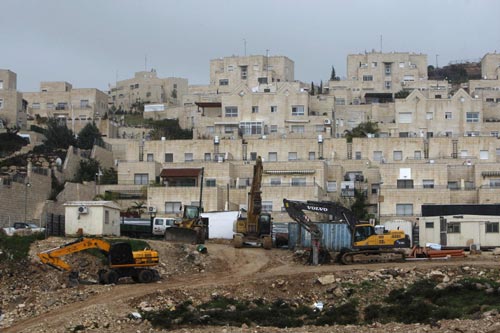Netanyahu 'right' to halt East Jerusalem building plan
Israel's Prime Minister Benjamin Netanyahu has come in for praise from an unusual quarter. The Israeli political left said he did the right thing when he persuaded the mayor of Jerusalem Nir Barkat to hold off on a controversial plan to redevelop an Arab part of the city.
 |
|
A construction site is seen in the settlement of Pisgat Zeev in east Jerusalem February 26, 2010. Israel has plans to build another 600 homes in occupied land it considers part of East Jerusalem. [Xinhua/Reuters Photo] |
However, Israeli analysts told Xinhua on Wednesday that it would appear that the agreement between the premier and the mayor is for a temporary freeze rather than a full-blown cancelation, and there will be no agreement on issues like this until there is a permanent peace deal between the Palestinians and Israelis.
Ambitious scheme
Barkat on Tuesday unveiled an ambitious scheme to build new homes for Palestinians alongside a cultural center, park, hotels and more facilities for the residents of Silwan, which lies just outside Jerusalem's famed Old City.
Around the time that Barkat was holding a news conference to announce the project, Netanyahu's office issued a statement saying it had convinced Barkat to hold off.
Netanyahu asked Barkat to work harder at finding an equitable housing solution for some 750 Arabs living in 88 structures on the King's Garden or al-Bustan area, some of the buildings slated to be demolished in the comprehensive upgrade over the next decade.
"I'm happy to accept the prime minister's request," said Barkat at the news conference.
Barkat insisted "the plan is for the benefit of the residents, alongside the importance of developing the area for the benefit of the world, for the benefit of tourists and for the beauty of Jerusalem."
But Palestinians hold little trust in Israeli promises to improve the area. Local Arab residents say the plan is a political ploy meant to gradually remove them from the area, and populate it with Jewish residents instead.
"I haven't seen any master plan for eastern Jerusalem for 43 years, not in the past and not in the future," said Daoud Siyam, a local Arab resident living in a house slated for demolition.
Barkat "tries to sell his stinking, filthy game that we've been hearing since 1967," he told Xinhua.
The 35-year-old taxi driver said he fears the plan will result in a slow "transfer of Arabs" out of the area on behalf of the eight Jewish families, living in nearby Jonathan House. The seven- story apartment was built without a permit in 2004, which faces Siyam's house from the nearby hillside.
Go to Forum >>0 Comments
 Add your comments...
Add your comments...
- User Name Required
- Your Comment
- Racist, abusive and off-topic comments may be removed by the moderator.
 0
0 






